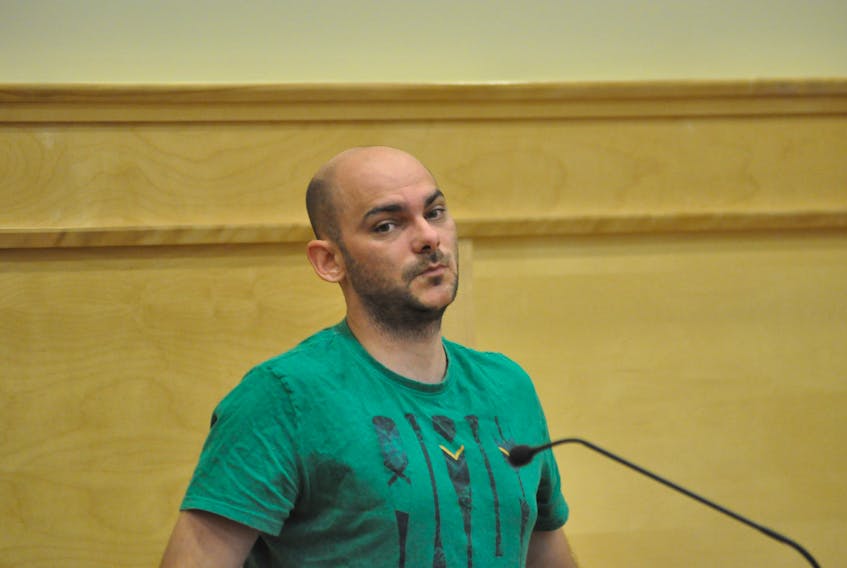Just as the internet gives sexual predators unprecedented access to victims all over the world, the judiciary finds itself dealing with an issue its predecessors could never have imagined.
Those were the thoughts of Judge Wayne Gorman as he delivered a seven-year sentence in the case of Matthew James Carter of Corner Brook at provincial court Wednesday afternoon.
Carter, 34, was sentenced for six offences involving internet luring and distributing child pornography.
RELATED:
'Corner Brook internet luring case seeking jail time for Matthew Carter'
The sentence exceeded what Crown attorney Adam Sparkes, who requested a prison term in the range of four to five years, had asked for.
It was more than double the amount of three years suggested as appropriate by defence lawyer Sandi MacKinnon.
The victims contacted by Carter for sexually explicit chats were all young girls from the United Kingdom between the ages 11 and 14. He sent some of them sexually explicit videos and images, along with the sexual messages.
The oldest of the girls was a special needs child who functions at a level four years below her age. She was the only one who reciprocated with Carter’s request for an exchange of sexually explicit images of themselves.
The court heard he subsequently shared images of that girl with another person.
“A request by a sexual offender that a child in his presence perform a sexual act should no longer be seen as any different as a request to do so online,” Gorman said when sentencing Carter, referencing his written decision on the case.
“In many instances, the latter is worse because of how difficult it is to prevent. Thus, we must recognize that the online sexual abuse of children can at times be as serious as the personal sexual abuse of children.”
The judge went on to say the use of the internet by young people is becoming more and more common, which also exposes them more to sexual predators lurking online.
Carter’s online activity was uncovered through an investigation by police in the United Kingdom that ultimately led them to make contact with the police in Corner Brook.
While the charges against him involve four specific children contacted through Instagram and the ooVoo social networking application, the investigation revealed he had chats with other, unknown teenage girls.
The geographic distance between him and the identified victims was only known to one of the girls at the time of the communications, Gorman was told. In victim impact statements filed with the courts, some of the victims expressed fears for their own safety and that he might come after them in person.
The parents of two of the girls filed victim impact statements, which expressed their abhorrence at the kind of contact made, the restrictions subsequently placed on their daughters and the anxiety and fear that affected other aspects of their social lives.
The parents of one girl took control of her digital devices once their daughter had told them an older man had contacted her. The screenshots they took of Carter exposing himself played a large part in the subsequent investigation and the guilty pleas he entered.
“We were aghast that despite him clearly being informed that he was speaking to a 12-year-old girl, he insisted on sending pictures of his penis and even went on to contact her by video, actually revealing himself – evidencing that he clearly has neither control nor boundaries around his deviant behavior,” her parents wrote in their victim impact statement. “It was only because we had previously educated our daughter around keeping safe online that this situation did not
escalate.”
In a pre-sentence report used as part of the sentencing process, Carter indicated pornography had become a problem for him and that being arrested was good in that he might finally get the help he needed.
In his decision, Gorman said the gravity of these offences is at the highest level, as is Carter's moral culpability. This is particularly the case, ruled the judge, for distributing child pornography involving a child with special needs.
In sentencing him, Gorman said Carter’s actions were not an accident or a mistake.
Carter had been in prison for 289 days of the past year before his sentencing. Given the credit of 1.5 days for each day served prior to sentencing, his seven-year sentence was reduced by 434 days.
In addition to the prison term, he will be on the national sex offender registry for life and must submit a sample of his DNA to authorities.
For the next 20 years, he is also prohibited from volunteering or working in a position of trust or authority towards a person under the age of 16, from having any communications with anyone under the age of 16 without being in the presence of an adult who is at least 21, and cannot use the internet or any other digital network to contact any person under 16.
Matthew Carter’s inappropriate online activity between November 2015 and February 2017 included:
-137 transactions involving chats with teenage girls
- 47,345 images (15 categorized as child pornography)
- 306 images indicated an interest in children
- 16 images of child being assaulted by an adult
- 701 videos (52 categorized as child pornography)
- ages of victims appeared to be three to 16 years
Source: Provincial Court of Newfoundland and Labrador









